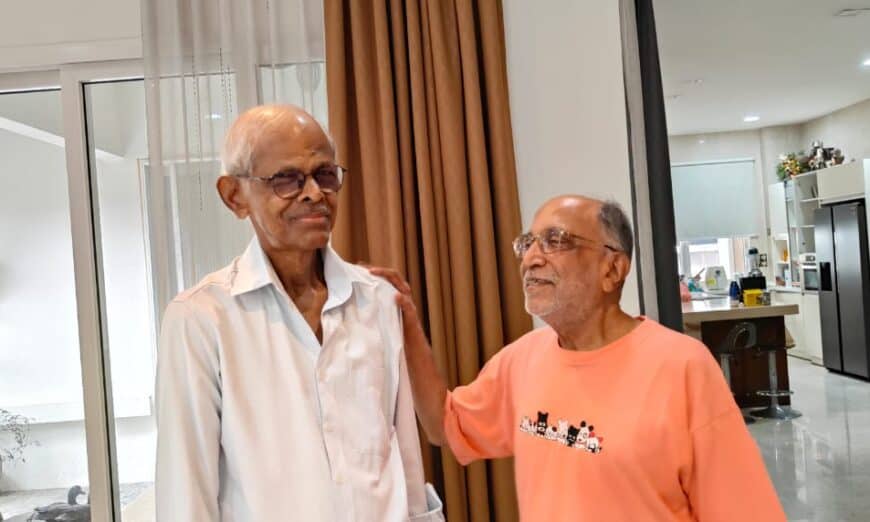THE ageing fraternity of sportswriters, of the 1970s and 80s vintage, are taking time out this week to mourn the death of a valued member, R. Retinavelu, affectionately known as “Velu”.
Velu succumbed to cancer last Sunday at the age of 76. He had been ill with the dreaded disease for some years, a fact made more poignant by the uterus cancer that claimed the life of Shirley Mun, his wife, nine years ago.
Velu began his sports writing career in 1975 with Star Publications in Penang. I had the privilege of working alongside him when I joined The Star in 1976. He was a humble man, never one to speak ill of others. The word ‘gossip’ simply was not in his vocabulary.
In those days, we worked on typewriters, as laptops and mobile phones were unheard of.
One memorable event was covering the Thomas Cup qualifying tie between India and Malaysia in Ludhiana, Punjab. Along with our sub-editor, Gerard Suchard Singh, we followed RTM’s live broadcast from our office in Pitt Street, taking turns to listen and then typing up our reports on Underwood or Olympia typewriters. Deciphering our own scribbled notes was often a challenge. Our sports chief, Khoo Kay Soon, and the late sub-editor, Vincent Manickam David, worked tirelessly to edit our stories and get them to press on time.
We were all exhausted but exhilarated when Malaysia, after trailing 1-3 against a formidable Indian team featuring the rising star Prakash Padukone, managed a miraculous 5-4 victory after all nine matches.
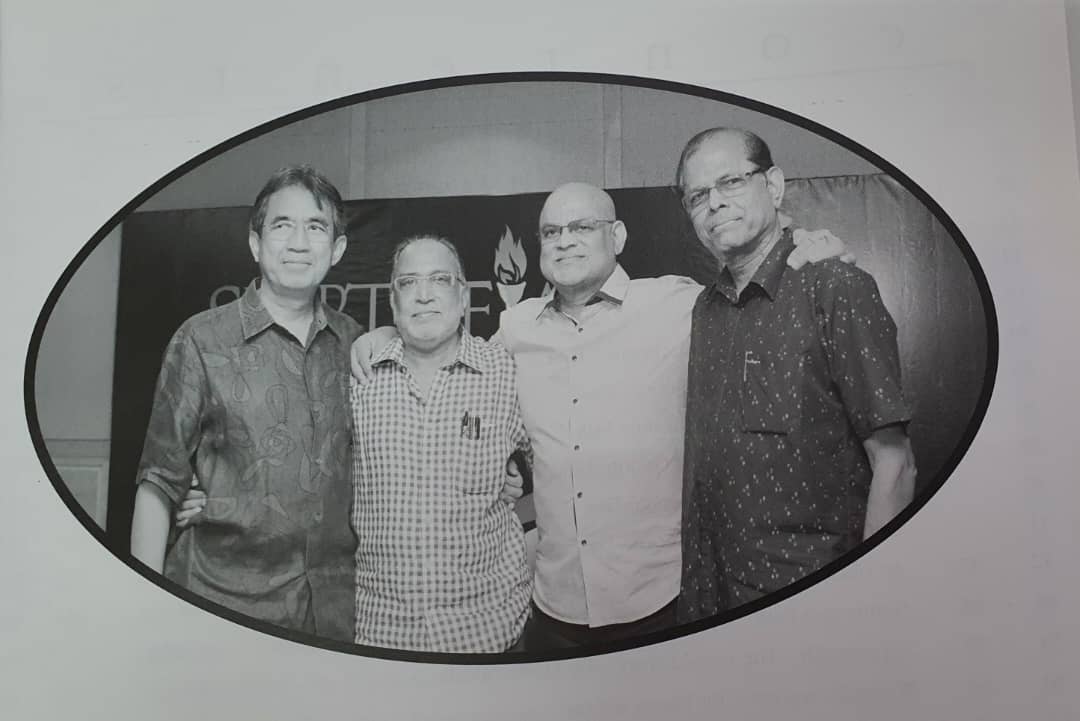
In late 1977, he migrated to the sports desk of the New Straits Times. There his writing flourished under the “R. Velu” byline that became a synonym for clear reporting and sensible commentary, features that marked him out as a journalist to watch.
A self-effacing presence and admirable personal dignity saw him stand out among a circle with its fair share of jostling egos.
He loved athletics, especially middle- and long-distance running, after reading stories of world champions like Peter Snell of New Zealand, the 800 metres and 1,500 metres Olympic champion in 1964, Herb Elliot of Australia, another top runner in the same era, Roger Bannister, the first man to break the 4-minute barrier for the mile or the Finnish and African long-distance runners.
“The discipline, dedication and tough training regime shown by these athletes fascinated me. The races were exciting to read about or watch as they were all about tactics, mental strength and endurance,” he wrote.
His first major assignment was covering the 1977 Southeast Asian (SEA) Games in Kuala Lumpur, which provided him the opportunity to interview top athletes and officials of the time.
One official who left a lasting impression on him was the late Tan Sri Khir Johari, then president of the Badminton Association of Malaysia (BAM).
Velu caught up with Pak Khir, as he was fondly known, just as he was leaving his house in Damansara Heights. He sought Pak Khir’s reaction regarding the International Badminton Federation (IBF, now the Badminton World Federation) and the breakaway World Badminton Federation (WBF), led by China, due to the two-China issue.
“Pak Khir was a man who stood by his principles and convictions. When the government then directed BAM to leave the IBF and join the WBF, Pak Khir stood firm with the IBF. He was convinced the WBF wouldn’t last long and it would be better for Malaysia to stick with the IBF. He was proven right as the WBF subsequently wound up and China, along with the other WBF members, joined the IBF,” Velu wrote in his article for Sports Flame.
Sports Flame featured rare sports treasures compiled by noted writers such as George Das, Terence Netto, Lazarus Rokk, A. Subramaniam, and R. Velu, along with contributions from various sports personalities.
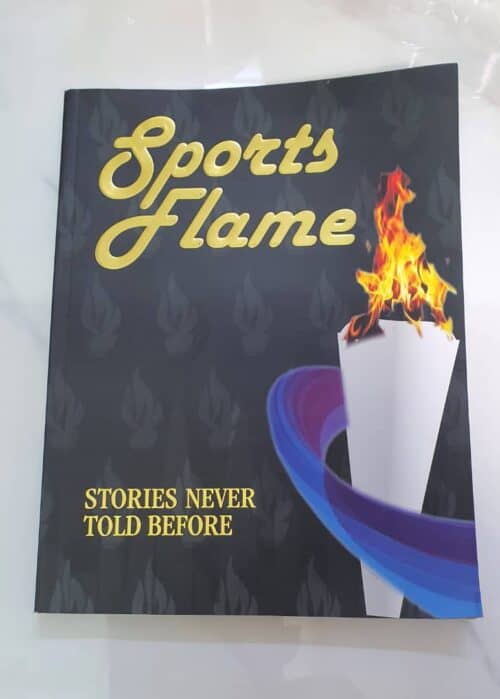
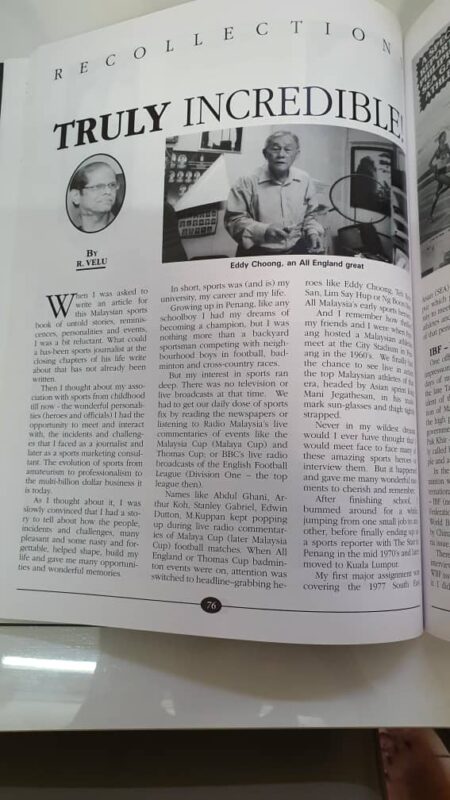
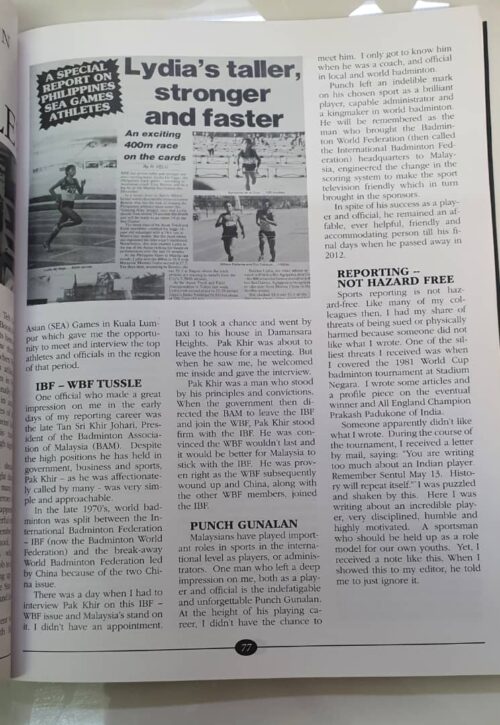
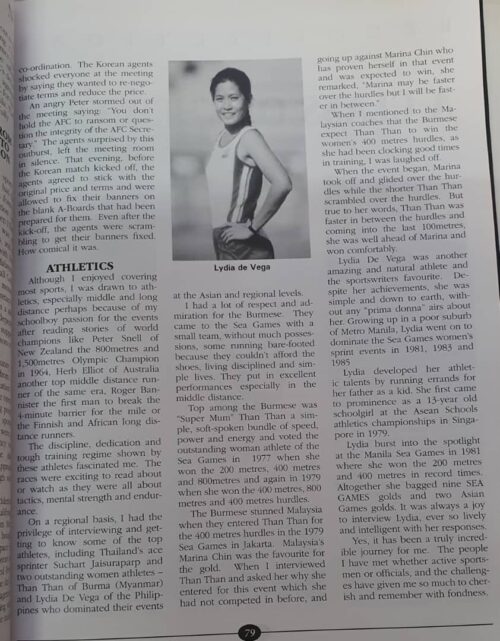
But the bleak prospects for upward mobility in the NST compelled reporters like Velu to enlist with a new publication, the biweekly Sports Mirror, launched in the early 1980s.
But the Malaysian public’s meagre affinity for the written word saw Mirror, following a bright start, dribble into insolvency from low sales and slender advertising support.
In 1986, Velu launched himself into a new career as a sports marketing consultant. He soon hit paydirt.
He was appointed marketing consultant for the 1991 SEA Games in Manila by the Philippines Olympic Committee (POC), following his company’s successful marketing of the 1989 SEA Games in Kuala Lumpur. The president of the POC was the late Gov. Jose C. Sering, a skilled politician with excellent people skills, aligned with the Marcos era.
Velu recounted the challenges he faced, noting that the Organising Committee, comprised mainly of officials from President Corazon Aquino’s new administration, attempted to break his company’s contract by obstructing its marketing plans. However, with the support of Gov. Sering, who threatened to cancel the Games, the Organising Committee eventually relented and agreed to new terms, allowing the Games to proceed successfully in Manila.
“It has been a truly incredible journey for me. The people I have met, whether active sportsmen or officials and the challenges I faced have given me so much to cherish and remember with fondness,” Velu reflected in Sports Flame.
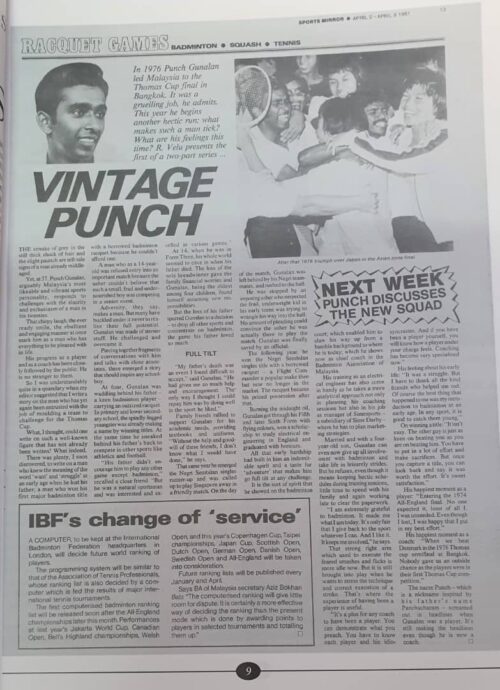
Kay Soon remembers Velu as a quiet and diligent worker at both The Star and The New Straits Times.
“He was a dedicated worker. As a junior reporter, he always responded very politely to your queries. Even as he matured, he never changed – always down to earth. That was his character,” Kay Soon said.
George Das, a former sports reporter with The Star and The New Straits Times, recalled the harrowing time Velu endured when his wife was stricken by cancer. When Velu himself was diagnosed with the disease, Das recounted hearing Velu ask God once, “Why did it happen to me?”
“Here was a man who never had a harsh word for anyone. Gentle, kind, humble, and extremely generous. He gave freely and would always tell me, ‘George, let’s help,’” Das said.
“He fought a good battle. He may have lost, but there was no humiliation in this battle. Life was always a challenge for Velu. But where is the answer to ‘Why does a good man suffer?’”
“Thank you, Velu, for the trust you had in me. I hope I was the friend you needed till the end,” Das shared.
Velu later replied in a text message: “When I look back, I see what an amazing journey we had through all the ups and downs. I see the hand of God in what we did. Although our friendship was tested at times, we survived. I truly value it, George.”
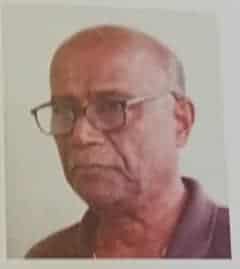
As long-time friends, George Das, Terence Netto, and I visited Velu on Dec 24 at his home in Damansara Legenda, Petaling Jaya, knowing his days were numbered. Surprise and gladness lit up his face when he saw me, as the last time we met was over two years ago for a meal at a Hainanese restaurant in George Town.
Terence, too, shared a few words with Velu and led us in a prayer for him. I could see the peace on Velu’s face.
“Velu was a gentleman in and out of the office,” Terence remarked.
We then left his room to let him rest. As I turned back for one last look, I saw him lift his left hand high. I went back, held it tightly with my right hand, and hugged him, my eyes now teary. I knew that was my last hug for Velu before I flew home to Penang.
Farewell, friend.
Story by K.H. Ong
Pic courtesy of Sports Flame

